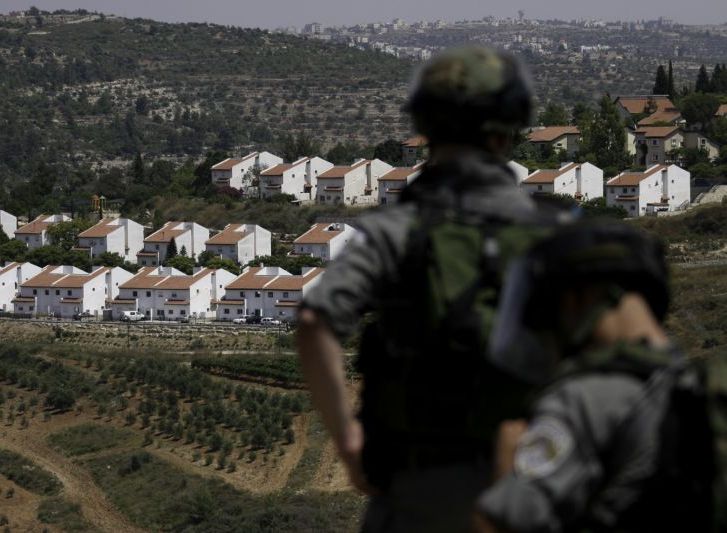Adalah: AG must retract legal opinion giving green light to appropriation of private Palestinian land
Adalah – The Legal Center for Arab Minority Rights in Israel is demanding that the Israeli attorney general retract his opinion granting a legal green light to the appropriation of private Palestinian land in the West Bank for the purposes of building a settlement access road.
Attorney General Avichai Mandelblit issued a formal legal opinion on 8 November 2017 contending that there are no legal obstacles to appropriating private Palestinian lands for an access road to the illegal West Bank settlement of Horsha, following a Supreme Court decision delivered in October 2017 (HCJ 794/17 Ziadeh vs. Military Commander in the West Bank, 31.10.2017). In that case, the Supreme Court ruled that Israeli settlers in the West Bank are a civilian community and that the Israeli military commander is therefore allowed to take their welfare and humanitarian needs into consideration.
Adalah, in a letter sent to Mandelblit on 19 February 2018, demanded the attorney general retract his opinion and order Israeli authorities to refrain from acting upon it.
In his opinion, Mandelblit wrote that "the appropriate of private property – which does not constitute a complete expropriation of the right of ownership and that also includes the payment of compensation to the injured property owners – is not to be considered unlawful confiscation of private property, in the context of Article 46 of the 1907 Hague Regulations." [Emphasis in original]
According to Mandelblit, there are no additional impediments, in terms of authority held by the state, to seizures of private land rights in the occupied West Bank if conducted for the benefit of the Israeli settler population – considered a civilian community in accordance with the Ziadeh ruling – and they are therefore not "complete expropriations."
Adalah Attorney Suhad Bishara wrote in her letter to Mandelblit that his legal opinion contradicts international humanitarian law:
"This legal opinion seeks to utterly negate the protections granted by international humanitarian law to the property rights of protected residents of the occupied territories. International humanitarian law forbids the State of Israel, as an occupying power, from exploiting occupied lands for its political or civil needs – including for the construction of settlements."
Attorney Bishara noted that Mandeblit's opinion contradicts his position on the Settlements Regularization Law that he presented to the Israeli Supreme Court within the framework of his opposition to that law. (See HCJ 1308/17, The Silwad Municipality, et al. v. The Knesset, et al, case pending). Mandelbit clarified his position on the issue of expropriation of private land – through the seizure of possession and the payment of usage fees – that, in light of the constitutional protection to which the right to property is granted, there is special importance in the protection of private land; also because of the denial of the ability to realize rights in the property. (Article 111 of the attorney general's opinion in HCJ 1308/17)
The Settlements Regularization Law allows West Bank settlements built on privately-owned Palestinian land to be "legalized" by de facto expropriating the land, planning the settlements, and retroactively authorizing the housing already constructed on the land. The law "regularizes" settlements in the West Bank with territories unilaterally annexed by Israel such as the Golan Heights and East Jerusalem, in direct violation of international law.
"The proposed arrangement contradicts the obligations of the [Israeli] military commander in Judea and Samaria to protect the property of the Palestinian population in the area, as it is an arrangement for the expropriation of property rights and the expropriation of land from their legal owners," Mandelblit told the Supreme Court. "This is a duty set forth in the provisions of international law in territory under belligerent occupation, which has been recognized and anchored in the Supreme Court's ruling."
Nevertheless, in parallel, Mandelblit also then noted that “validating” the settlements is a worthy act and that the State of Israel has a number of other tools at its disposal that allow it to “validate” Israeli construction on private Palestinian land that was transferred to a settlement “in good faith.” Mandelblit authorized use of these tools including, amongst other measures, appropriation of Palestinian land for “public needs,” such as “regulating” the construction of an access road to an illegal Israeli settlement outpost.
- CLICK HERE to read the letter [Hebrew]
- CLICK HERE to read Adalah’s paper on the Responses of the Government and the Attorney General to the Settlements Regularization Law [English]

















